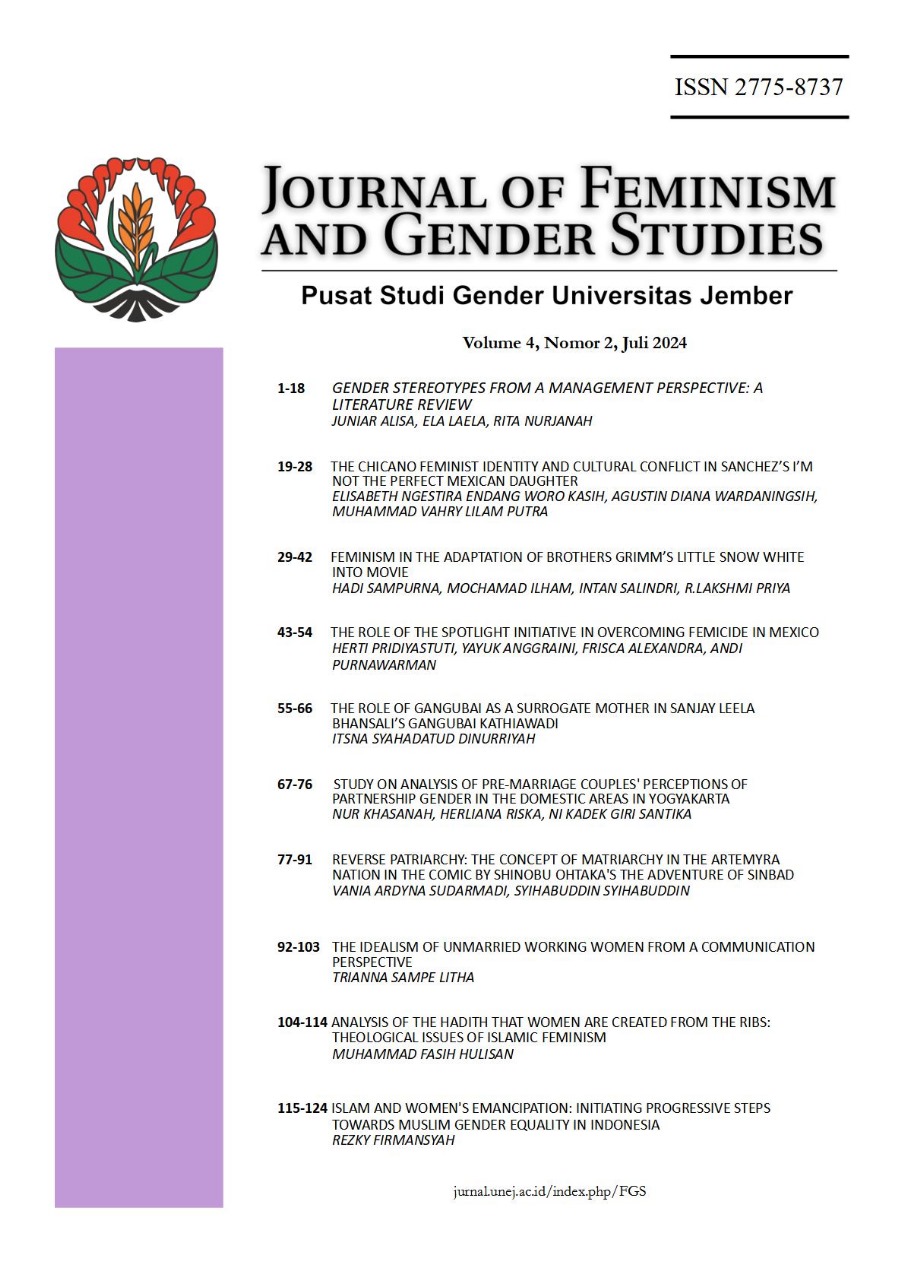The Role of The Spotlight Initiative in Overcoming Femicide in Mexico
Abstract
Gender-based violence (GBV) is an issue that has received attention at the international level. In Mexico, almost 50% of women have reported being victims of violence perpetrated by their partner or ex-partner to the point of their death. The type of GBV that has experienced a significant increase is femicide or the killing of women just because of gender. The number of cases of femicide in Mexico has averaged 1.500 cases annually since 1985. In the period 1993-2005, there were at least 370 victims femicide that have been identified. This causes Mexico to become a country that is considered unsafe for women, especially with a high level of impunity in Mexico, where 93% of crimes are not reported nor investigated, including femicide. The machismo culture that is very attached to social life in Mexico emphasizes how domination is owned by men over women. The Spotlight Initiative program in Mexico is one of the government's efforts aimed at strengthening, complementing, and supporting existing gender-related initiatives in Mexico, particularly for femicide and violence against women. With 2 phases, the first phase in 2019-2021 and the second phase in 2021-2022, the Spotlight Initiative program is expected to have a positive impact on women in Mexico and can also eliminate acts of violence against women in various forms. However, the program has no significant effect on the level of femicide that occurs in Mexico. The strong influence of machismo culture has become a strong factor in its occurrence femicide in Mexico.
References
Agren, D. (2021). Amlo ridiculed for saying Mexico’s feminist movement began two years ago, The Guardian. Available at: https://www.theguardian.com/world/2021/sep/29/mexico-amlo-president-feminist-movement (Accessed: 12 July 2024).
Amnesty International. (2005). Mexico: Justice fails in Ciudad Juarez and the city of Chihuahua, Amnesty International USA. Available at: https://www.amnestyusa.org/reports/mexico-justice-fails-in-ciudad-juarez-and-the-city-of-chihuahua/ (Accessed: 12 July 2024).
Berna, M.B. (2015). Gender Violence within the Inter American System of Human Rights Protection. The Resurgence of Gender Cultural Construct, Logos Universality Mentality Education Novelty: Political Sciences and European Studies, III(1), pp. 49–65. Available at: https://doi.org/10.18662/lumenpses.2015.0301.04.
Fragoso, J.M. (2009.) An Analysis of Feminicide in Ciudad Juárez: 1993-2007, in Strengthening Understanding of Femicide. Using research to galvanize action and accountability. Washington DC: Program for Appropriate Technology in Health (PATH), InterCambios, Medical Research Council of South Africa (MRC), and World Health Organization (WHO), pp. 78–83. Available at: https://media.path.org/documents/GVR_femicide_rpt.pdf.
Gallón, N. and Picheta, R. (2020). Murder of 7-year-old girl in Mexico fuels anger and protests over brutal killings, CNN. Available at: https://www.cnn.com/2020/02/19/americas/mexico-fatima-cecilia-murder-scli-intl/index.html (Accessed: 12 July 2024).
Keohane, R. (1984). After Hegemony. Princeton: Princeton University Press.
López, M. (2022). “We are tired of being told it is not a big deal”: Institutional Machismo in Mexico, Georgetown Journal of International Affairs, 20 May. Available at: https://gjia.georgetown.edu/2022/05/20/we-are-tired-of-being-told-it-is-not-a-big-deal-institutional-machismo-in-mexico/ (Accessed: 12 July 2024).
McGinnis, T.D., Ferreira, O.R. and Shirk, D.A. (2022). Analyzing the Problem of Femicide in Mexico: The Role of Special Prosecutors in Combatting Violence Against Women. Working Paper Series Volume 19, Number 2. San Diego: Mexico Institute. Available at: https://justiceinmexico.org/publication/analyzing-femicide-mexico_working-paper/ (Accessed: 12 July 2024).
Meno, M. (2017). Femicide in Juárez, Mexico, Undergraduate Research Journal of the College of Arts and Letters, 3, pp. 24–36.
Morena, I. de la. (2020). Machismo, Femicides, and Child’s Play: Gender Violence in Mexico, Harvard International Review. Available at: https://hir.harvard.edu/gender-violence-in-mexico-machismo-femicides-and-childs-play/ (Accessed: 12 July 2024).
MPTFO. (2018). Mexico Spotlight Programme. New York: The United Nations Multi-Partner Trust Fund Office (MPTFO). Available at: http://mptf.undp.org/project/00111639 (Accessed: 12 July 2024).
MPTFO. (2019). Mexico Annual Narrative Progress Report. New York: The United Nations Multi-Partner Trust Fund Office (MPTFO). Available at: https://mptf.undp.org/sites/default/files/documents/35000/ar2019_mexico_spotlightinitiative_final.pdf (Accessed: 12 July 2024).
Sánchez, E. and Rodriguez, L. (2020). Femicide on the Rise in Mexico During the COVID-19 Pandemic, Global Citizen. Available at: https://www.globalcitizen.org/en/content/mexico-cuts-womens-institute-budget-femicide-rises/ (Accessed: 12 July 2024).
Sida. (2015). Preventing and Responding to Gender-Based Violence: Expressions and Strategies. Sundbyberg: Swedish International Development Cooperation Agency. Available at: https://cdn.sida.se/publications/files/sida61848en preventing-and-responding-to-gender-based-violence-expressions-and strategies.pdf (Accessed: 12 July 2024).
Spotlight Initiative. (2019). Spotlight Initiative: a hope to fight femicide in Mexico. Available at: https://spotlightinitiative.org/news/spotlight-initiative-hope-fight-femicide-mexico (Accessed: 12 July 2024).
Sterling, S. (2018). Intimate Partner Violence in Mexico: An Analysis of the Intersections Between Machismo Culture, Government Policy,and Violence Against Women (2018), International Studies Undergraduate Honors Theses [Preprint]. Available at: https://scholarworks.seattleu.edu/intl-std-theses/15.
Terrazas-Carrillo, E. and Sabina, C. (2019). Dating Violence Attitudes Among Latino College Students: An Examination of Gender, Machismo, and Marianismo, Violence and Victims, 34(1), pp. 194–210. Available at: https://doi.org/10.1891/0886-6708.VV-D-17-00172.
United Nations Human Rights. (2014). Sexual and Gender-Based Violence in the Context Of Transitional Justice. Geneva: United Nations Human Rights. Available at: https://www.ohchr.org/sites/default/files/Documents/Issues/Women/WRGS/OnePagers/Sexual_and_gender-based_violence.pdf.
World Health Organization. (2019). Respect Women: Preventing Violence Against Women. Geneva: World Health Organization. Available at: https://iris.who.int/handle/10665/312261.
Wright, M.W. (2011). Necropolitics, Narcopolitics, and Femicide: Gendered Violence on the Mexico-U.S. Border’, Signs: Journal of Women in Culture and Society, 36(3), pp. 707–731. Available at: https://doi.org/10.1086/657496.
Youke, M. (2021). Vulnerable in Lockdown: Violence Against Women in Mexico Rises Amid Coronavirus Restrictions, BTI Blog. Available at: https://blog.bti-project.org/2021/03/11/vulnerable-in-lockdown-violence-against-women-in-mexico-rises-amid-coronavirus-restrictions/ (Accessed: 12 July 2024).

This work is licensed under a Creative Commons Attribution-ShareAlike 4.0 International License.











